Thursday, April 09, 2020 / 11:48 AM/ By NOVA Merchant Bank / Header Image Credit: AdvisoryHQ
Current Account: Deficit on the Run asPressure Mounts
The current account balance recorded a combineddeficit of $17 billion in 2019 compared with $3.9 billion surplus in 2018.Specifically, the deficit of $7.0 billion in Q4 19 more than exceeded our estimateof $2.7 billion following the appearance of the first trade deficit in thirteenquarters of $1.5 billion (estimate of $861 million surplus) and a wider thanexpected services deficit of $9.26 billion (estimate of $6.53 billion). On thebalance of trade, Q4 19 witnessed a surge in non-oil import, even as oilimports slowed. Compared to average non-oil import of $12 billion over Q1 to Q319, Q4 standalone was $15 billion to push overall import to $17.2 billion (+17%QoQ and +75% YoY). Interestingly, the cumulative non-oil imports of $51 billionover 2019 (oil import of $11 billion) far exceeded $29 billion in 2018 (oilimport: $11.6 billion). While we reckon that ongoing capacity expansion in oilrefinery and railway construction magnified the numbers over 2019, we are alsosurprised about the scale of growth in manufactured goods import by 60% YoY. Onthe other hand, export over Q4 fell by $1.4 billion to $14.79 billion followingdecline in oil export by $1.5 billion. With cumulative 2019 export of $64.98billion (+6.14% YoY) compared to total import of $62.11 billion (+52.4% YoY),the trade surplus moderated to $2.87 billion compared to $20.47 billion in2018.
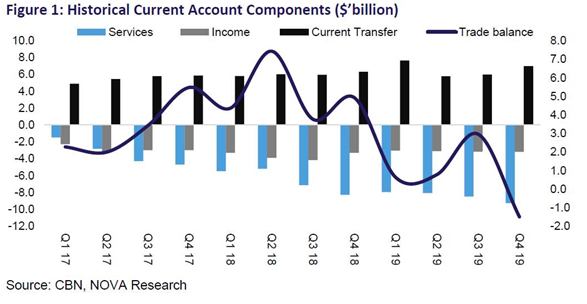
Asmentioned above, the services deficit deepened over Q4, with cumulative 2019deficit of $33.8 billion (2018: $26 billion). Personal travel and professional& business services accounted for bulk of the increase in services deficitover 2019. On the positive, while income deficit narrowed to $12.5 billion (Q419: $3.2 billion), current transfer surplus leapfrogged to $26.4 billion (Q419: $7 billion), even as workers' remittances declined marginally to $23.5billion.
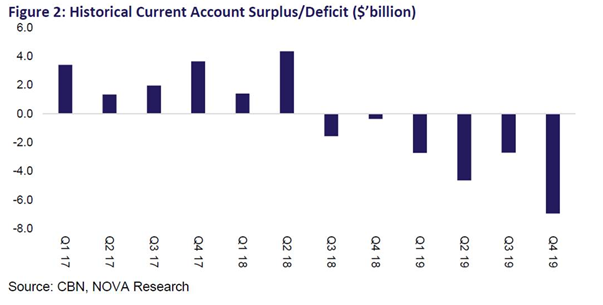
Over2020, the depressed global crude oil prices amidst pressured demand pose majorrisks for the export and the trade balance. Intuitively, we reckon thatsustained pressure on oil revenue will result in CBN implementing someadministrative measures to limit the scale of imports (especially, non-oilimport) and even services demand as witnessed in 2016 prior to the introductionof personal travel and business travel allowances. Beyond CBN actions, thespread of Covid-19 across major economies – even as we expect a successfulcontainment without major escalation beyond Q2 – will have a major impact ontravel and related services for the rest of the year. Also, given the expectedlower return on investment and feedthrough of the global shock on individual income,we model lower income deficit and workers' remittances respectively. As in thetable below, our base case models a trade deficit of $9.1 billion (compared to2019 surplus of $2.9 billion), services deficit of $20.1 billion (compared to2019 deficit of $33.8 billion), income deficit of $10 billion (compared to 2019deficit of $12.5 billion) and current transfer surplus of $19.6 billion(compared to 2019 surplus of $26.4 billion). All told, we expect currentaccount deficit of $19.6 billion in 2020, exceeding 2019 level of $17.0billion.
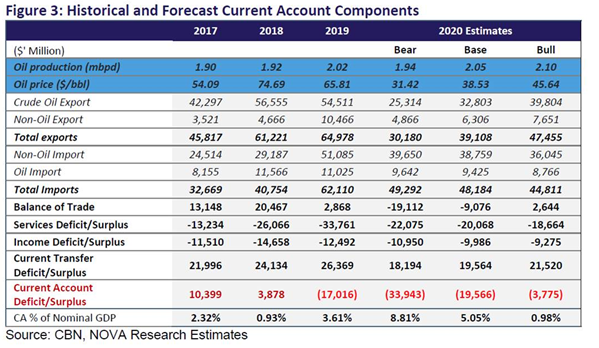
FPI Outflows Escalate
Theapex bank recorded its highest monthly intervention sales at the IEW in March,with the gross external reserve depleting by $1.0 billion to adjusted level of$34.0 billion. The apex bank net FX sales totaled $2.9 billion, compared to netsale of $1.7 billion in February. Notably, outflows during the month amountedto $3.5 billion (-3% MoM), foreign inflows was a meagre $335 million, whilelocal supplies (ex-CBN) was only $819 million with the market recording adeficit of $2.7 billion. Over Q1 2019, foreign inflows summed to $3.8 billion,outflows of $9.2 billion with the apex bank net sales of $4.3 billion (netpurchase of $4.3 billion in Q1 19). The lower foreign inflows amidst sizeableselloffs largely reflect the impact of the global risk-off sentiment and thedwindling reserves, both of which have limited the rate of portfolio inflows,even as more funds exit the economy.
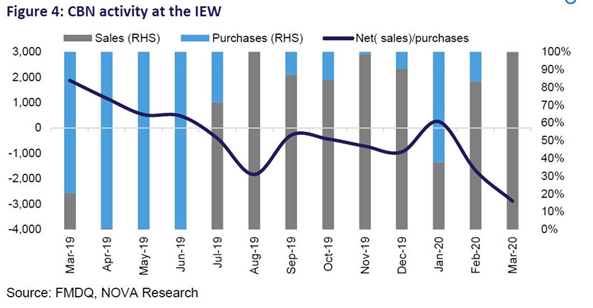
Notably, activities at OMO auctions in March depictedlimited foreign portfolio participation. While the apex bank offered a total ofN250 billion in response to maturing instruments of N671 billion (with foreignholdings of 50%), subscription came in at just N120 billion which largelysuggest low FPI participation. Reflecting the mounting pressure on the exchangerate and gross reserve, the CBN initiated adjustments to the NAFEX and BDCrates to synchronized level of N380/$, and upward revision of the official rateto N359.5/$ (from N307/$) to support higher oil revenue in Naira terms. Postthe adjustment, the NAFEX rate has further depreciated, closing the month atN384.45/$.
Atother segments, the CBN sales increased by 8% MoM to $4.0 billion in March. Salesto the SMEs, Invisibles and SMIS (retail and wholesale) windows declined 23%MoM to $659 million due to the CBN's rationing of dollars and DMBs loweringbids to avoid unusual debits by CBN for bidding excessively at SMIS auctions.Elsewhere, non-auction and BDC sales increased by 12% MoM to $3.4 billion.Overall, CBN intervention sales across windows increased by 19% MoM to $6.9billion. Even with the dollar rationing at the interbank and SMIS, it is ourunderstanding that the apex bank is yet to deliver on most sales in the monthof March, which is why we refrain to interpret these sales as actual cashtransactions, save for the IEW and BDC sales.
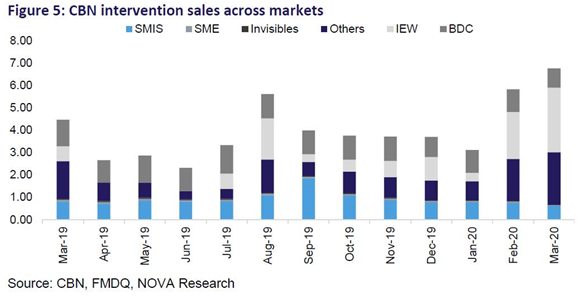
Asmentioned above, the apex bank initiated upward adjustments to both the NAFEXand official rates to limit pressure on the reserves in March. With limitedinflows in sight and reduced avenues to control outflows, we do not see theadjustments having any material impact on the reserves (See report: RecentPrice Adjustment Will Have Limited Impact). As such, we believe the only optionthat will have any meaningful impact on the reserve is an outright floating ofthe exchange rate with intermittent intervention to avoid unnecessaryspeculative attacks. That said, we believe current breakup in supply chains andthe effect of the ongoing COVID-19 pandemic across countries would haveresulted in a sharp decline in import demands and even services.
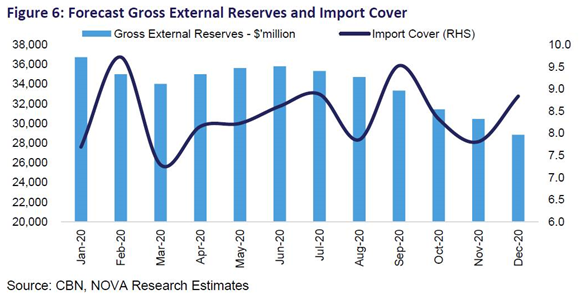
Inmodelling the reserve position over the rest of the year, while we haveadjusted expected oil inflows to reflect the depressed oil price and theabsence FPI inflows, we also note the impact the suspension of sales to BDCswill have on CBN FX sales. For every month the apex bank defers sales to BDCs,about $1.1 billion is saved. Also, the minimal demand for services (especiallybusiness and personal travel allowances) and imports could also halve relatedFX demands. As such, the major pressure for the reserves are offshore holdingsof maturing fixed income instruments, which is estimated at $10.6 billionbetween April and December.
Assuming 100% of the offshore holdings are repatriated(which is a worst case scenario), and absence of BDC sales in April and Maywith a resumption of sales in June (amidst limited import and services demand),the gross external reserves could end the year at $28.8 billion. However, giventhe scale of fixed income sales by offshore investors prior to maturity, thetiming of the repatriation might defer from our monthly expectations based onthe maturity profile. While the partial price adjustment and subsequentdepreciation suggests a year to date weakening of the NAFEX rate by 5.5%, it isstill below our fundamental based purchasing power parity rate of N405/$.
Breakup in Supply Chain MarchesInflation Upwards
Month-on-monthinflation expanded at a slower pace in February by 0.79%, coming below 0.82%MoM in January and our forecast of 0.85% MoM change. The slower expansioncompared to the prior month was largely mirrored in both the food and the coreindex. The food index declined 12bps MoM to 0.87% (to mark the slowest MoMchange in more than twelve months) following a sharp decline in processed foodby 60bps to 0.99% which was further supported by 7bps softness in farm produceto 0.86% (a fallout of buoyant market supplies of tubers, millet, rice, andmaize remain despite the conclusion of the main harvest season). For the Coreindex (-9bps MoM to 0.73%), the decline stemmed from most constituents,including Clothing & Footwear (-12bps to 0.76% MoM), Health (+19bps to0.80% MoM), Transport (-5bps to 0.75% MoM) and HWEGF (-3bps to 0.54% MoM).
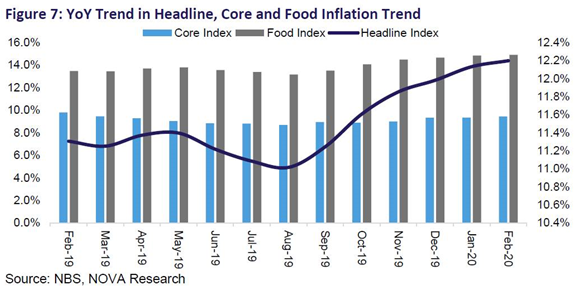
Comingbelow our estimate, inflation rate expanded by 12.20% (coming ahead of Januarylevel of 12.13%) to beat our estimate by 7bps. The expansion emanated fromincreases in both the core and food index. Surprisingly, while the core index(9bps to 9.43% YoY) had been muted in the prior month, it increased at a muchfaster pace compared to the food index in the month of February, followingincreases in HWEGF (+21bps to 7.81%), Transport (+12bps to 9.43% YoY), Health(+8bps to 9.94% YoY) amongst others. The food index (+6bps to 14.90% YoY)continues to reflect the low base of the prior year, which is further espousedby the feedthrough of the land border closure on food prices (with a graduallyfading impact as seen in the MoM movement).
Eventsover the last two weeks in March to a large extent changed our view of pricemovement over the rest of the year. While we had stated that the disruptiveimpact of a breakup in the supply chain would transmit to temporary higherprices (due to feedthrough from scarce imported commodities and higher demandfor local substitutes), the abrupt adjustment to the exchange rate and jump inprices of essential items (due to the lockdown) will further magnify the upsidein prices. However, we note the downward adjustment to PMS prices, but webelieve the impact will be muted since it was not immediately effected acrossmost states and yet to reflect in downward adjustment to transportationexpense. All told, we expect the consumer price index to expand by 0.93% MoM,with headline YoY expanding to 12.36% YoY in March. Beyond March, the delay inthe effective date for the increase in electricity tariff to July still playedwell with our earlier model. But we expect the impact of the exchange ratedepreciation, higher transportation cost of essential items due to lockdown andexpected fluctuation in PMS prices due to monthly price modulation (as crudeoil prices trend higher) to have a combined effect on inflation for the rest ofthe year. All told, we revised average inflation rate for 2020 to settle at13.55% on our base case.
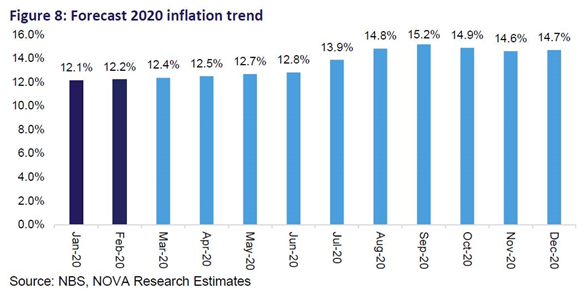
Related News
- COVID-19 in Nigeria: Economic Perspectives and Mitigating the Risks
- Coronanomics: Nigeria Needs Economic Pragmatism and Robust Institutions - Dr. Temitope Oshikoya
- Nigeria's Total Public Debt Stood At N27.40trn in Q4 2019 - NBS
- High Debt Service, Low Revenue Collection
- FAAC Disburses N647.35bn in February 2020 - NBS
- PMI Reading No 84: Fall on Global Headwinds
- Debit on the Services Account Exceeds $10bn in Q4 2019
- Modest Rise in the FGN's Domestic Debt; Debt Stock At N14.27trn As At December 2019
- Nigeria's Current Account Deficit Widened from -2.2% to -5.4% in Q4 2019
 Lagos, NG • GMT +1
Lagos, NG • GMT +1











 1312 views
1312 views











 Sponsored Ad
Sponsored Ad
 Advertise with Us
Advertise with Us









